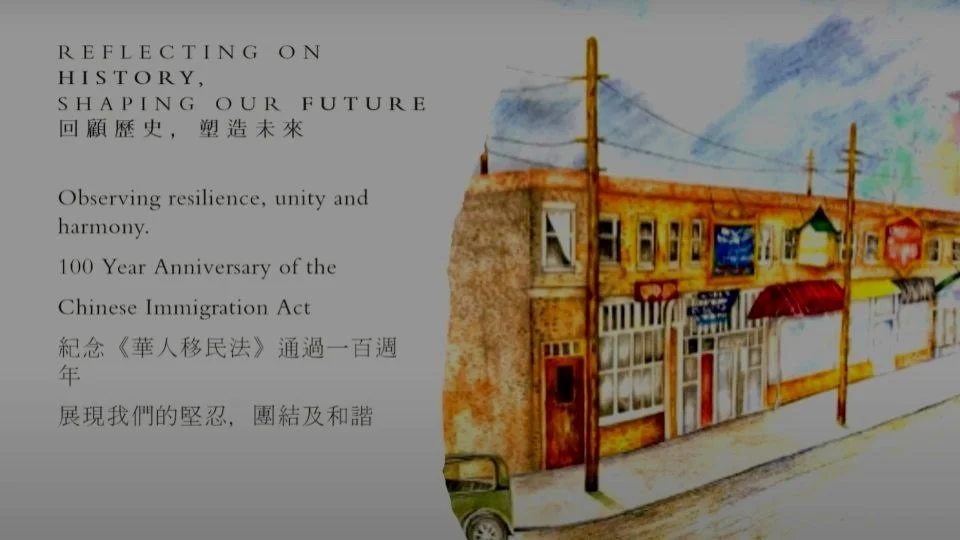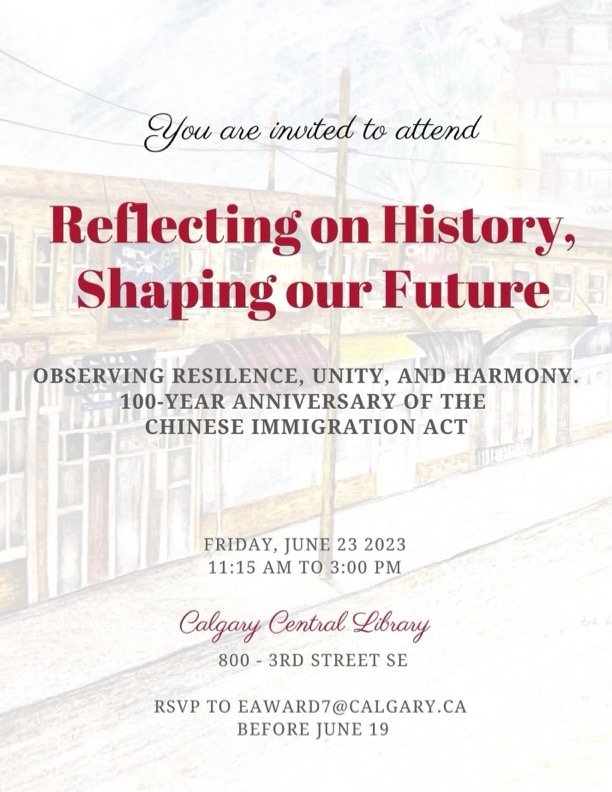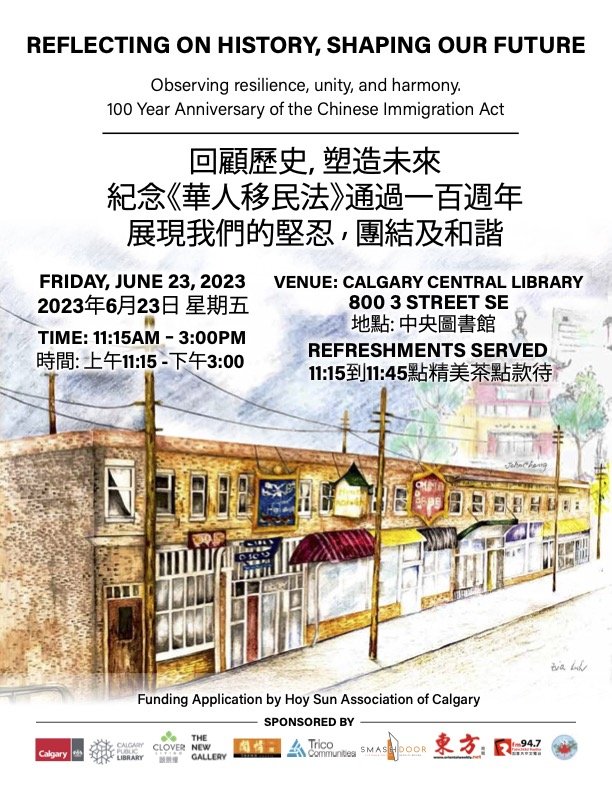Reflecting on History, Shaping our Future
Central Library, Calgary
Watch recorded event
Observance of the 100th centenary of the Chinese Immigration Act
July 1st, 2023 marks the 100-year centenary of the Chinese Immigration Act.
Mayor Gondek, Ward 7 office, City Arts and Culture, TRICO, and the Hoy Sun Association of Calgary (representing the Chinese and Chinatown community) were to observe the 100-year anniversary of the Chinese Immigration Act through three events:
Tuesday June 20, City Council Public Hearing at 0930 hours
The Mayor’s Proclamation ‘Observance of the 100-Year Anniversary of the Chinese Immigration Act’ was presented to the Chinese and Chinatown community by Ward 7 City Councillor on behalf of Mayor Gondek. A short oral history and personal impact statement was delivered. This will be livestreamed on Council Web.
Friday June 23, Central Library – 800 3 Street SE – at 1115 hours
Shaikh Family Welcome Gallery, Patricia A. Whelan Performance Hall
National Remembrance of the 100-Year Centenary of the Chinese Immigration Act live streamed from the Chambers of the Senate of Canada.
On this day, hundreds of fellow Calgarians as we:
Hear the stories of the Chinese immigration and lives in Calgary and the evolution of Calgary Chinatown as told by Association Professor Matt Patterson, Chinese residents, and narrators
Watch Asian music, dance, and martial arts demonstrations
Recognize 100 Calgarians who were builders, developers, investors, community leaders, and political leaders to establishing the Chinese and Chinatown communities over the past 100-years
Give honour to the 15 Calgarians in-person selected as significant influencers, if not leaders, of this cultural community.
And watch, live streaming, from the chambers of the Senate of Canada,
The National Remembrance of the 100-Year Centenary of the Chinese Immigration Act
by the Speaker of the Senate, The Honorable Raymonde Gagné
Greetings by the Government of Canada
The unveiling of the Official Commemorative Plaque by Dr. Richard Always, Chair, Historical Sites and Monuments Board of Canada
Remarks by Honourable Yuen Pau Woo, Senator – British Columbia
Background
Between 1881 and 1885, 15,000 Chinese labourers came to Canada to work on the Canadian Pacific Railway. Many others came to mine minerals from Western Canada’s mountains or lived a life of servitude. The railway workers faced harsh and dangerous conditions, long hours, and less pay than other workers. When the railway was completed in 1885, many Chinese were abandoned and left to either return to Chinatown as their resources or stay in Canada to find employment, housing and to establish a new life. Many Chinese arrived as chosen by their village elders to go to Canada to make a better life for themselves and to help their family and community back home, who were facing civil unrest and drought.
As labour demand decreased, the government introduced the Head Tax to stop the flow of Chinese immigration to Canada. Head Tax certificates were in use from 1885 to 1923. The Head Tax was only imposed on immigrants from China and was intended as a means to restrict Chinese from entering North America (both Canada and the US imposed this tax). Originally costing $50, the tax was increased to $100 in 1900 and to $500 in 1903, where it remained. The certificates were receipts marking the payment of the tax. They were typically issued from Guangdong province (formerly known as Canton) in China (point of origin) but were also issued in Victoria and Vancouver, BC (ports of landing).
Head Tax certificates were the earliest example of photo identification issued by governments in North America. Now, individuals of Chinese descent living in Canada were not eligible for citizenship and had no legal status, whether immigrant or Canadian-born. The Head Tax certificate remained a primary identification paper for Chinese Canadians. For many, paying off the $500 Head Tax debt took decades. Adjusted for inflation, that $500 would be close to $7,500.00 today.
On July 1st, 1923, the Head Tax was supplanted by the passing of the renewed Chinese Immigration Act, which effectively banned all immigration of Chinese Nationals to Canada (fewer than 50 Chinese people were allowed to immigrate to Canada between 1924 and when the Act was repealed in 1947). Only six classes were exempt: diplomats, clergymen, merchants, students, tourists and men of science. The involvement of Chinese Canadians who served Canada in the Second World War gained the right of citizenship and the right to vote for all Chinese Canadians, granted in 1947.




